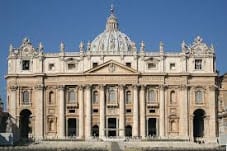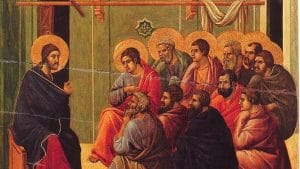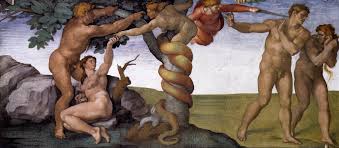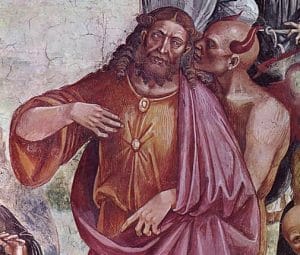In the last post, it was discussed that an evolutionary paradigm, motivated by a spirit of transhumanism that was at the heart of the development of the new delivery methods for so-called vaccines. It was also mentioned in passing how much of the debate so far as centered upon the question of the use of aborted fetal tissues in both the testing (Moderna and Pfizer) and delivery (AstraZeneca and Johnson and Johnson). Despite this connection to abortion, there are many in the Church that have reasoned that it is morally licit and perhaps even laudatory to receive the vaccine. In this post, we will discuss why it is neither and we should avoid these and all abortion tainted vaccines.
As usual, the devil is in the details—except this time, the Devil really is in the details. The four current vaccines all make use of fetal cell lines originating in an aborted child. Moderna, Pfizer, and AstraZeneca all used cells derived from the HEK293 cell line while the Johnson and Johnson used cells from the PER-C6 line. These came from different children; the former came from the kidney (HEK=Human Embryonic Kidney, one can imagine that it was not the only sample since it has the number 293,even if it is the most “fruitful” of the collection) of a child in 1973 and the latter from the retina of a child in 1985. The degree to which each of these vaccines is tainted by the evil of abortion is certainly different. Although whether this is morally relevant or not is open to discussion. Before getting to that however, it is good to ponder just what we mean when we say it is tainted by abortion.
The Devil Is in the Details
Most of us would have difficulty imagining how these cell lines are gathered. Perhaps we might think that a bunch of abortions are performed and they have a bunch of tissue left over that they then sell to harvesters and researchers. Or maybe we think that the harvester went door to door at abortion mills and ask if they had any extra tissue around. In truth however the harvester must have arranged a priori, presumably through informed consent of the mother, to gather the cells from the child at the time of the abortion. Like regular organ donation, fetal organ donation must be fresh in the sense that the live tissue would be preserved right as the abortion is happening. It might also be that the child is removed along with the womb and kept alive until the harvesting could occur at some secondary site. The point is that the developer wasn’t just some opportunist, but absolutely complicit in the abortion. He arranges with both the abortionist and the mother beforehand and does nothing to stop it at the time. Presumably, there is compensation both to the abortionist and the mother, meaning that he has actually encouraged it.

But it isn’t just the abortion that is the problem now. The developer of the line commits a further evil when he keeps the child alive and harvests his or her organs. Let that settle in—a child is removed from (or with) his mother’s womb, possibility refrigerated and then, while still living, has his organs removed. This is the stuff of Mengele’s dreams. The evils now begin to multiply. The researcher, because he demands the cell lines for testing, may or may not be cooperating with the abortion, is most certainly cooperating and complicit in organ harvesting. So while we might be able to say there is a moral difference between simply using the cell line for testing versus using it for delivery, it is not a difference in degree but in number. Any researcher that uses the cell line formally cooperates in the organ harvesting.
In order to avoid the reductio ad Hitlerum accusation, it is important to discuss the reference to Josef Mengele. Regardless of the usefulness of the results and the data, everyone agrees that to use data from any of his experiments is unethical. This is because the way in which these experiments were conducted was so evil that conscience forbids the use of the results. Certainly a Catholic conscience should shudder at having anything to do with abortion and organ harvesting tainted vaccines, regardless to what degree a given Pharmaceutical Company used them. Some actions such as harvesting organs from innocent, living pre-born children is so evil that there is no good that would justify using them. As the former abortionist Bernard Nathanson said, “it is impossible to separate the issue of abortion from the use of the tissue obtained therefrom.”
Appropriation vs Cooperation
This is why framing the use of these vaccines only in terms of cooperation is incomplete at best. Cooperation with some act in the past is almost always remote. Appropriation, that is, whether we can reap the fruits of someone else’s past evil act in the present is another question. We might not cooperate to the evil of abortion and organ harvesting, but that does not automatically mean we are free to benefit from it. For example, suppose I buy a bike that I later find out was stolen. I am obligated to return that bike to its rightful owner, regardless of whether I actually cooperated with its theft and regardless of how desperately I need the bike.
The theft of the bike is illustrative because in a very real way the organs have been stolen from these children. Once we become aware of that fact, we must make restitution by returning them to their rightful owner, God by providing them with a proper burial. This is why it is always an act of charity to bury a person. When these aborted children were murdered, in justice they must be buried and as long as they remain unburied, the evil is ongoing. While we may not have the means to gather up all the remains from this child, we most certainly have no right to benefit from their murder and dismemberment.
This is why the two vaccines, Johnson and Johnson and AstraZeneca, that deliver the vaccine through cultures grown in the cell line (that will contain a part of the child’s body, namely their DNA) must be avoided. There is no question as to whether if there is a grave enough cause or not. It is a clear violation of justice. The other two vaccines currently on the market, might be justified for an extremely grave reason. I say might because it is hard to imagine that given the evil that has been done to the unborn persons anyone would in good conscience be willing to do so.
What is clear is that receiving any of these vaccines can not be reduced to an act of charity nor as an obligation to the common good. Charity is a love of God and love of neighbor for His sake. It cannot be an act of charity to compromise with evil or reap the fruits of a gravely evil action. Furthermore, the common good must work for the good of every member of a society. For the vaccines to truly be instruments of the Common Good, then the goods attached to them must flow back over even the unborn members of society. Clearly, these vaccines are prejudiced against some of the unborn.
In closing it is worth mentioning that the Church’s teaching that focuses on the principle of cooperation has truly backfired. There are many cases in which a child (or an adult with the COVID vaccines) receives a “a vaccine which was developed using cell lines of illicit origin” when there is no serious “danger to health.” Not surprisingly the “the duty to make known their disagreement and to ask that their healthcare system make other types of vaccines available” (c.f. Donum Vitae, 8) has fallen upon deaf ears. We are currently 0 for 4 on the COVID vaccines and there is no reason to think that will change. Perhaps if, and this would need to happen from the top, Catholics en masse refused the Covid vaccines, then we wouldn’t be in this moral quandary.


















